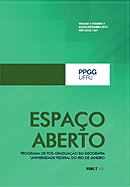From Territorial Water Supply Planning to Social Water Cycle: an Analysis of the Guapiaçu Dam Project (Cachoeiras de Macacu/RJ)
DOI:
https://doi.org/10.36403/espacoaberto.2021.41671Keywords:
Territorial Water Supply Planning, Guapiaçu Dam Project, Macro-Local Scale, Social Water Cycle, Water DeficitAbstract
The present work analyzes the problematic nature of territorial planning of water supply in the eastern Rio de Janeiro metropolitan area as illustrated by contradictions present in the Guapiaçu dam project. Even if the project is legally based on the notion of the “common good” with regard to water distribution and is justified by the need to solve a metropolitan water “deficit”, the social water cycle underlaying the proposal reveal the basic contradiction that the dam will flood the land of hundreds of small family farmers.
Metrics
Metrics Loading ...
Downloads
Additional Files
Published
2021-12-22
How to Cite
VIEIRA, Thiago Wentzel de Melo. From Territorial Water Supply Planning to Social Water Cycle: an Analysis of the Guapiaçu Dam Project (Cachoeiras de Macacu/RJ). Espaço Aberto, Rio de Janeiro, Brasil, v. 11, n. 2, p. 25–43, 2021. DOI: 10.36403/espacoaberto.2021.41671. Disponível em: https://revistas.ufrj.br/index.php/EspacoAberto/article/view/41671. Acesso em: 28 nov. 2024.
Issue
Section
Articles
License
The copyright of articles published in Espaço Aberto belong to their respective authors with rights to first publication conceded to the journal. Every time that the article is cited and reproduced in institutional repositories or personal and professional web pages the link to the journal web page must be provided. The articles are simultaneously licensed under the Creative License Commons BY-NC-SA 4.0.


